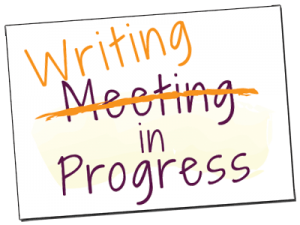making decisions is one of the most energy-intensive things we do as humans. Making a decision just plain takes a lot of calories. With a complex life, our brains are exhausted most days, too exhausted to make good decisions. Mark Silver
A common scenario
You have a sense that you should be writing regularly. You don’t have time actually blocked off in your calendar but in your head you think of Fridays as research days, or have an intention to write every morning, or something.
This means that every day (or every Friday), you have to make a decision: Will I write today?
Actually you have to make multiple decisions: Will I write today? How much time to I really have to write today? What will I write today?
That’s a lot of energy going into decision making.
You have a limited supply of energy
You are busy. You know how tired you’ll be by the end of term.
If you are already having trouble finding the time and energy to write during term time, you really don’t have extra time and energy to spend on decision making about writing.
No wonder you end up half way through term despairing at the lack of time available to do any research and writing.*
*If you don’t end up like this, let me just cheer. You are obviously doing something right. Keep doing it.
How to reduce those decisions
 First, make one decision about how much time you can devote to writing. Then block that time in your schedule at the beginning of term. Schedule other things around it.
First, make one decision about how much time you can devote to writing. Then block that time in your schedule at the beginning of term. Schedule other things around it.
I lead a Planning Your Semester call every August and December to guide you through that, because this is the hard part. Making the decisions, seeing what other decisions that effects, and adjusting until you have a plan you can commit to is hard. Putting most of that decision making into one 90-minute session saves you energy in the long term. (Foundations of an Academic Writing Practice includes recorded versions of these planning sessions. You don’t have to wait until the beginning of the next semester to make a plan.)
Once you have it in your calendar, writing at that time will be your default setting. No decision necessary. It may take you a few weeks to really build that habit. Every once in a while you may need to skip a scheduled writing session, but the decision will be about doing that other thing not about writing. Your default will be writing. You’ll need a good reason to do something else.
Second, line up support to help you keep that commitment. That might be something formal like A Meeting with Your Writing, or something you arrange with friends or colleagues. Figure out what works for you and put it in place. (There are ideas in the 15 minute/day Academic Writing Challenge materials.)
Third, figure out how to make decisions about what to write. The key here is not to spend a lot of time worrying about whether what you are doing is the best thing. During your writing time, do something that moves one of your writing projects forward. Use the energy to write, not to make decisions. If you participate in A Meeting With Your Writing I help you with this at the beginning of every meeting.
Related post:
Do you suffer from decision fatigue? (John Tierney, NYT Magazine, Aug. 17, 2011)
A version of this post was originally published August 29, 2012. It has been edited.









Writing is hard. Writing demands dedication. Writing requires discipline.
The “make a meeting with your writing” tip resonates with me. As a professional writer, I must dedicate my energy to getting the job done. Often setting aside writing time in the calendar is what it takes to wake up my focus and concentration.
Great post, Jo!